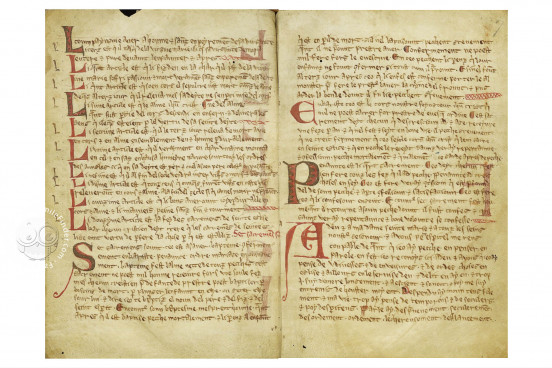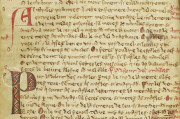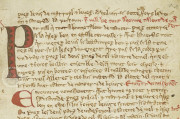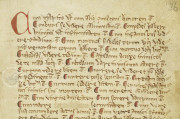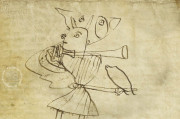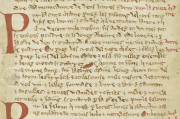A rare survival of the high Middle Ages, the Compilation of Oxford is a layman’s commonplace book written in the 1270s. It was created in the environs of Worcester perhaps by the owner-scribe Richard Grimhill. It contains ninety-seven separate miscellaneous texts in three languages, Latin, Anglo-Norman French, and Middle English. These include prayers and devotional texts, fictional fables and romances, recipes and spells, and a calendar.
The texts and information selected for inclusion ranged from important and useful to amusing and frivolous. Numerous naïve marginalia illustrate words and concepts, perhaps used as teaching tools, and pointing fingers are used to indicate the beginning of an important passage. The parchment is of poor quality and the layout and Anglicana script suggests functionality and economy took priority in its creation. The book was created for personal and household use and provides an enchanting window into the stories, spells, and curiosities of medieval daily life.
Unique Copies of Pre-Chaucerian Fabliaux
Among the dozens of texts contained in the Compilation of Oxford, sixteen are unique to this manuscript: four in Anglo-Norman French and twelve in Middle English. The works "Dame Sirith" and "The Fox and the Wolf" are the only extant copies of these pre-Chaucerian fabliaux, ribald tales characterized by contrarian and humorous depictions of institutions such as the Church and the nobility. Versions of popular fabliaux appear in Giovanni Boccaccio's Decamerone and Geoffrey Chaucer's Canterbury Tales and inspired passages in works like Reynard the Fox.
Features Arabic Numerals and Unlucky Days
Many texts in the Compilation of Oxford are informational rather than entertaining. They record novelties such as the “new” Arabic numerals, popular superstitions like a list of unlucky days, and information of cultural importance like the opening passage describing the Seven Deadly Sins.
The book also contains a calendar, an important tool for tracking holy days in the Christian year, but also used to record familial and political events such as births, deaths, and a list of English kings.
Written and Illustrated by Owner-Scribe
The book was owned by the Grimhill family. The patriarch, Richard Grimhill, was likely responsible for the compilation. It passed to his daughter, Amice, through whom it came to the Underhill family.
In the sixteenth century, it was owned by Thomas Allen. In 1622, it came to Sir Kenelm Digby, who gifted the volume to Oxford in 1634.
Binding description
The current binding was commissioned by Digby featuring his coat of arms on a tooled leather cover with clasps.
We have 1 facsimile edition of the manuscript "Compilation of Oxford": Facsimile of Oxford, Bodleian Library, MS Digby 86 facsimile edition, published by Oxford University Press, 1996
Request Info / Price
